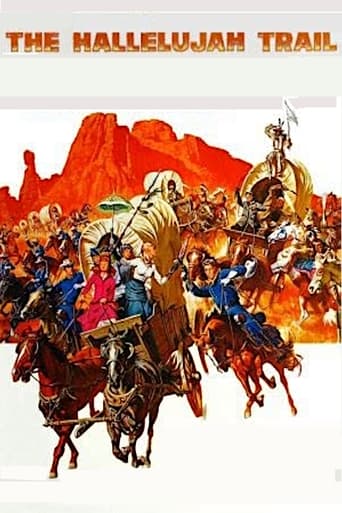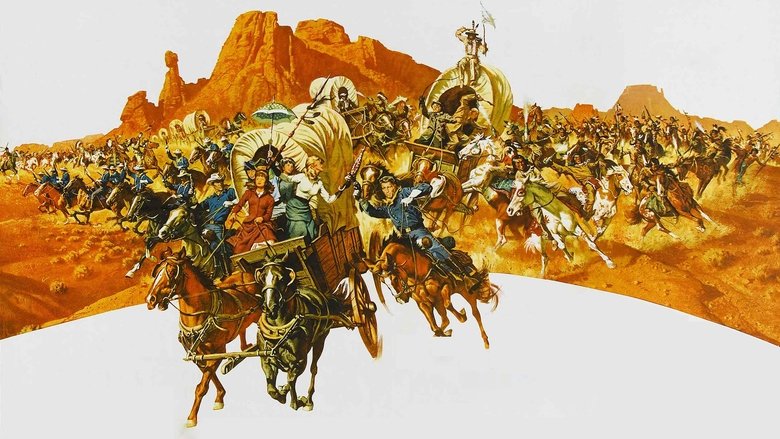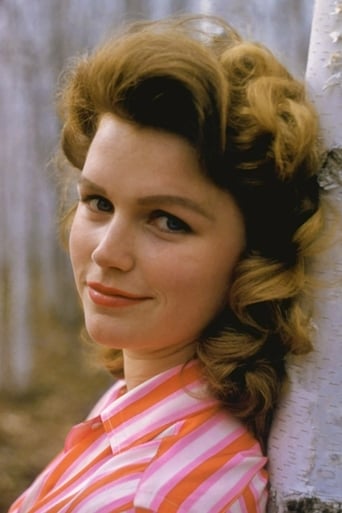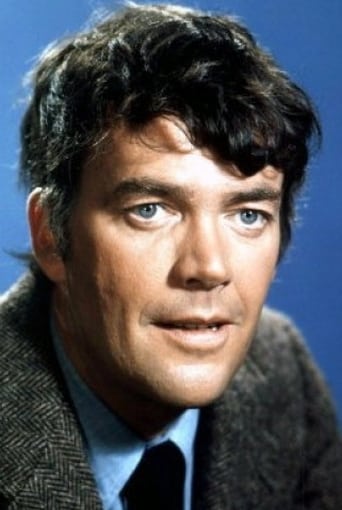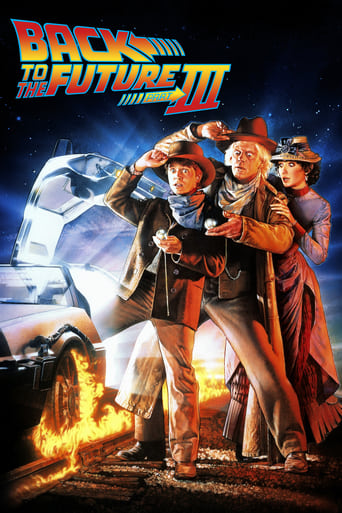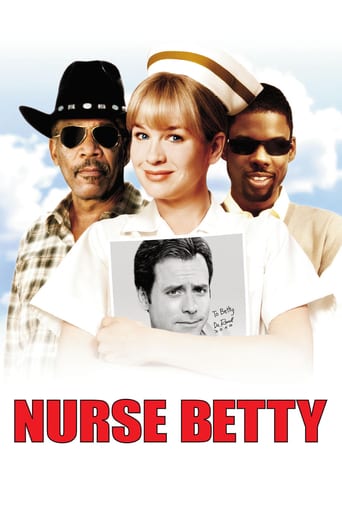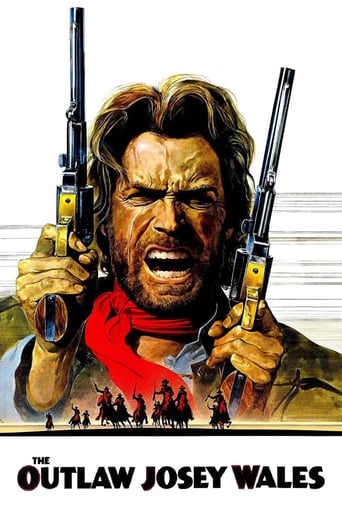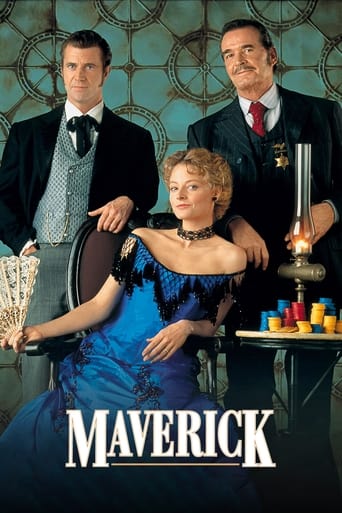The Hallelujah Trail (1965)
A wagon train heads for Denver with a cargo of whisky for the miners. Chaos ensues as the Temperance League, the US cavalry, the miners and the local Indians all try to take control of the valuable cargo.
Watch Trailer
Cast
Similar titles
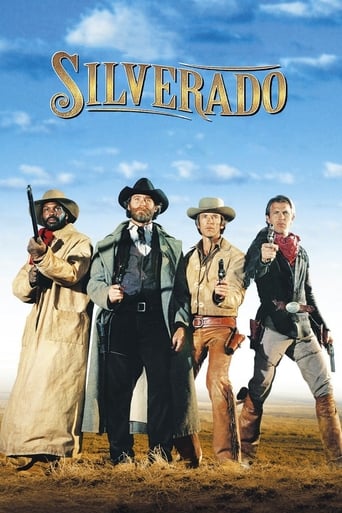
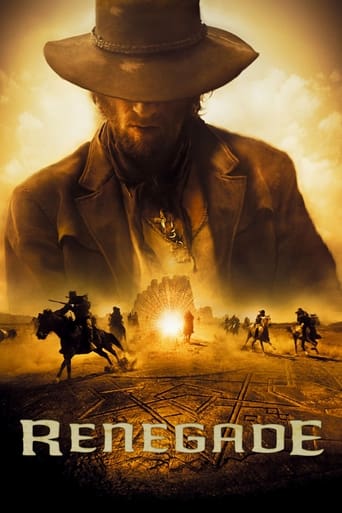
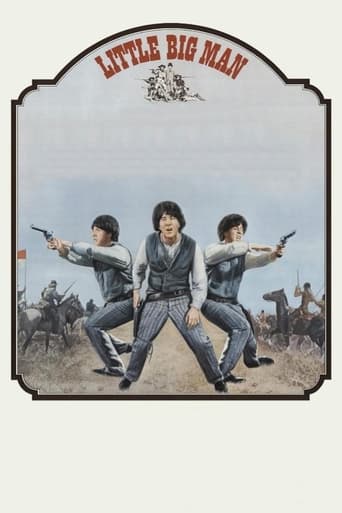
Reviews
Excellent, Without a doubt!!
This is a small, humorous movie in some ways, but it has a huge heart. What a nice experience.
Although I seem to have had higher expectations than I thought, the movie is super entertaining.
The acting in this movie is really good.
As with many movies making their way to disc I recalled seeing this film when I was younger. I'd always thought of it as a spectacle of a film and funny at the time. Going back and revisiting it today it remains a spectacle but not near as hilarious as it was to me when I was a child. But it is still entertaining and a great movie for fans of the stars to add to their collections.The movie takes place out west in 1867. The war is over, peace has been settled with the natives and cities are growing out west. In Denver the miners are aware that a long winter is on the way but concerned over one major issue. Someone forgot to place the order and they may run out of whiskey before winter even arrives! Consulting an old Indian guide named Oracle (Donald Pleasance) they place an order immediately.That order is being shipped to them by one Frank Wallingham (Brian Keith) who reminds all he comes in contact with that he is a "taxpayer and a good Republican" (which while perhaps funny is repeated far too often). Wallingham has sunk his last dollar into the shipment of 40 wagons of whiskey for Denver and demands protection in delivering the goods.That would fall upon the soldiers at Fort Russell. Commanded by Col. Thaddeus Gearhart (Burt Lancaster), who is just returning from patrol, the fort is in a bit of turmoil when he returns. Temperance leader Cora Templeton Massingale (Lee Remick) has roused the women in the area into her movement to ban alcohol and to call out for the suffrage movement. Torches ablaze, soldiers marching, the band playing when Gearhart returns to the commotion he's not pleased to say the least. The fact that his second in command Capt. Paul Slater (Jim Hutton) allowed to happen at the coercion of his daughter Louise (Pamela Tiffin) he's in love with doesn't help matters.Word then reaches the fort that they are to escort the whiskey wagon train and insure that it arrives in Denver unharmed. But it seems there were leaks then much as there are now. Massingale and the women hear of the wagon train and are determined to see that it is all disposed of, requiring the soldiers to protect them as well. At the same time the various Indian tribes get word of this as well and want a share of the whiskey for themselves. There is little doubt that all concerned parties will cross paths in the dust filled desert while the wagon train makes its way to Denver.Made in 1965 the film was released in a large screen Cinerama version that toured the country as well as an Ultra 70 Panavision version that played wide. Epic comedies like this were rampant in theaters at the time but ended up with mixed results. While offered as a comedy the laughs are sparse and the running time padded with far too much extra. At 175 minutes the movie would have played much better with at least 30 of those minutes excised. But hey, this was a spectacle and scenes of the mountain ranges and deserts of the west looked good up on that wide screen. While they still look impressive on the smaller screen they just take up time.A number of the jokes found in the film would seem normal for 1965 but trigger items for audiences of 2018. Audiences have become too troubled by these items and should take the time to realize the world as it was when viewing movies from the past rather than the world as it is today. At the same time the jokes on view here would be more inclined to entertain younger viewers old enough to understand the whiskey aspects but for whom humor can be found in people falling on their faces on treadmills. In other words this is not highbrow humor. It is still enjoyable for fans of the film and its stars but not perhaps for a widespread audience.Many who have already written about this release have been more concerned with the quality of the reproduction than the movie itself. When I read reviews like this I am reminded of the recent attempt to save the classic THE ALAMO from self-destruction. Made just 5 years prior to this film the John Wayne directed and starring film has languished on the shelves at the MGM studios for years and is slowly deteriorating. Calls for its restoration have fallen on deaf ears and in the meantime the film has lost a vast amount of footage that could have been used to create a pristine version of the film for decades to come. When watching this film my thoughts were that perhaps it's not a question of the film not being up to the standards of those viewers but of Olive Films having the availability to offer anything better than what we see here.As I said if you're a fan or Lancaster, Remick, Hutton or director John Sturges (who directed such classics as BAD DAY AT BLACK ROCK, GUNFIGHT AT THE O.K. CORRAL, THE MAGNIFICENT SEVEN and THE GREAT ESCAPE) then you'll want this film in your collection. For all others it might provide a nice evening's entertainment but with this running time start it early.
The plot premise is quite simple and a good western big picture style comedy for something from Hollywood in tail end of the innocent mid- 60's. It has a solid cast but the direction has them playing stereotype roles (stern commander, intolerant temperance leader, greedy business man, etc so nothing really great -- just good.The movie does runs too long in the second half during the encampment phase (all participants in the same area) after the sandstorm and would have benefited for a shorter run time. I consider this its primary negative.It carries on a theme that seems to have started in the 60's with comedies (TV) in having catch phrases such "good tax payer and good Republican" used repeatedly although not that memorable.
It's sheer entertainment. I think (as an adult) judicious trimming would have made this film a real classic, but the performances and the very pointed outrageous humor are just really fun. I love the narration and the "maps" which don't really show anything, making fun of that old technique. I'm sure many audiences of today might not even get how this is kind of the Airplane of the sixties. My family actually went to see another movie with top billing at the drive in and we all loved this one much more. It's just plain fun. A bit too long, I agree, but well worth it for the giggles. It's quite star packed for the time as well, once again, reminding me of Airplane in later years. I'm not a western fan, but this is more than a western, it's really a spoof or satire, with no one taking themselves seriously and that gives it a great deal of fun quotient.
I have always opined that "The Hallelujah Trail was well-directed and also one of the most hilarious situations ever set onto film. Bill Gulick's novel "The Hallelujah Train" was adapted to the screen by John Gay, and the film produced and directed by John Sturges. What emerges is perhaps the 'biggest-feeling' western comedy ever made, one that is even better seen in a large theater, where the pace allows time for the viewers' laughs that, by my personal experience, were sure to come. Apart from this small curiosity of telegraphing its best punch lines, the film is consistent, a triumph of logic and intelligent film-making from beginning to end for two reasons, I claim: namely that everything in it works as intended; and that its logic is all aimed at a single plot-theme--the corrupting or dislocating of the life of everyone within reach of its influence by the introduction of a large wagon-load of whiskey into the lives primitive U.S. Westerners. It is this spectre on the horizon which embroils many of Denver's miners, the region's Amerinds, a large ladies' temperance group, the Irish teamsters, and a number of citizens in the backwash of its passage. The storyline, narrated memorably by John Dehner, follows the effect of Frank Wallingham's decision to dispatch the train west on speculation in the hopes of realizing a large profit.. The story of the train is carried in newspapers; and one Cora Templeton Massengale decides to enlist wild-eyed pseudo-religious females in her crusade against its coming. A Denver miners' group, facing what looks to be an unprecedentedly-long, cold winter and having run out of alcohol, consult one Oracle Jones who advises them with manic and visionary force to "Go save that previous booze!". The Irish teamsters, denied a whiskey ration on a cargo full of whiskey, disrupt the train; and cavalry Colonel Gearhart and his men are then compelled to carry out their assignment to protect the train for Wallingham, who annoyingly keeps insisting he's "a taxpayer and a good Republican", whatever their feelings in the matter. The Indians settle the question of which tribe will make reconnaissance in comedic fashion--when one chief bonks the other over the head with a tomahawk during discussions; then they too join the hunt for "firewater". Obviously, a large collision was imminent by this point; and when Mrs. Massengale's protest to famous editor Horace Greeley about the possible harmful effect of the cargo falls on deaf ears, some collision becomes inevitable. The progress of the train, into a sandstorm on Whiskey Flats, causes all forces to meet and fire at one another and become hopelessly confused during a tremendous battle--within which not one person is hit by any bullets nor suffers permanent damage... As a result of this battle, the Colonel sends a patrol to try to reason with the Indians, who feign friendship, capture the patrol, and announce as the Colonel's interpreter notes, "Chief he say--"no more peace"".. The ladies who have been sent to take over the whiskey wagons by Mrs. Massengale also are captured, of course. So Colonel Gearhart has no choice but to bargain for the release of the women in return for a number of wagon-loads of whiskey, and champagne.. The exchange, one wagon at a time being driven off in trade for released hostages, becomes a disaster as the champagne corks begin to pop, the horse-teams driven by inexperienced Indians bolt and run at breakneck speed into Quicksand Bottoms, and finally--again with no loss of life-- the entire train stampedes and is engulfed in the vast zone of ooze, sinking slowly and irretrievably out of sight. By this time, the Colonel has fallen in love with Cora, his Lieutenant has won his daughter, who had joined the marchers, the Denver miners have turned to go home, the Irish teamsters are out of a job, the badly-shaken Indians trudge home sadder but wiser, and only Oracle Jones and Wallingham are left to regain such wagons as from time to time rise from the Bottoms' muck, to stirring musical accompaniment, providing enough for personal consumption but not much more. And despite all predictions, the winter turns out to be one of the warmest and driest on record. The film's music provided by Elmer Bernstein is positive and memorable, as always; cinematography by Robert Surtees, art direction by Cary Odell and costumes by Edith Head are outstanding and Award-level in quality.. The acting by Burt Lancaster as the Colonel, Lee Remick as Cora, Jim Hutton and Pamela Tiffin as the young lovers and Martin Landau as Walks Stoops Over is very good indeed. Others in the cast who shone included Brian Keith as Frank Wallingham, Donald Pleasence who is Award caliber as Oracle Jones, Whit Bissell as Editor Hobbs , Helen Kleeb as a temperance group officer, John Anderson as the Colonel's second, Robert J. Wilkie as Chief Five Barrels and Noam Pitlik as Gearhart's interpreter. Major Western comedies have always been few and far between, especially so satirically intelligent a script as this one; The dialogue here is among the funniest of which I have knowledge, the photograph is lucid and consistent; and the large budget also allows the skilled director to drain every drop of humor from the situation that can be gained. This is a comedy I suggest may be worth watching far more than once, a classic of its sort.
